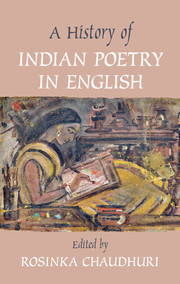Book contents
- Frontmatter
- Contents
- Contributors
- Acknowledgments
- Introduction
- SECTION I THE BROAD NINETEENTH CENTURY: INDIANS IN ENGLISH AND THE ENGLISH IN INDIA
- SECTION II PUBLISHERS, PUBLISHING HOUSES, AND THE PERIODICAL PRESS
- 9 “Zig Zag sublimity“: John Grant, the Tank School of Poetry, and the India Gazette (1822–1829)
- 10 “The Torch Not the Sceptre”: Writers Workshop, Calcutta
- 11 The Blue Rexine Archive: A Short History of Clearing House, a Poets’ Cooperative of the 1970s
- 12 “Melted Out of Circulation”: Little Magazines and Bombay Poetry in the 1960's and 1970's
- SECTION III POETRY: 1950–2000
- SECTION IV POETS OF THE DIASPORA
- SECTION V THE NEW MILLENNIUM POETS ON THEMSELVES
- Bibliography
- Index
12 - “Melted Out of Circulation”: Little Magazines and Bombay Poetry in the 1960's and 1970's
from SECTION II - PUBLISHERS, PUBLISHING HOUSES, AND THE PERIODICAL PRESS
Published online by Cambridge University Press: 05 March 2016
- Frontmatter
- Contents
- Contributors
- Acknowledgments
- Introduction
- SECTION I THE BROAD NINETEENTH CENTURY: INDIANS IN ENGLISH AND THE ENGLISH IN INDIA
- SECTION II PUBLISHERS, PUBLISHING HOUSES, AND THE PERIODICAL PRESS
- 9 “Zig Zag sublimity“: John Grant, the Tank School of Poetry, and the India Gazette (1822–1829)
- 10 “The Torch Not the Sceptre”: Writers Workshop, Calcutta
- 11 The Blue Rexine Archive: A Short History of Clearing House, a Poets’ Cooperative of the 1970s
- 12 “Melted Out of Circulation”: Little Magazines and Bombay Poetry in the 1960's and 1970's
- SECTION III POETRY: 1950–2000
- SECTION IV POETS OF THE DIASPORA
- SECTION V THE NEW MILLENNIUM POETS ON THEMSELVES
- Bibliography
- Index
Summary
On the cover of Arvind Krishna Mehrotra's Collected Poems 1969–2014, there is a long-haired young man holding a cigarette in his left hand. He is dressed in frayed jeans and a camouflage jacket, and sits on the wooden floor of a derelict Wisconsin farmhouse, legs outstretched, a closed door behind him. One can easily imagine that young man writing the following words of defiance in the late 1960s:
despite discouragement,
uneven sales, opposition,
financial catastrophes,
frowns, etcetera, the ezra-
fakir press continues.
& joins vachel lindsay
in saying: if I cannot
beat the system, I can
die protesting.
The above manifesto appears on the cover of ezra 2, the little magazine started by Arvind Krishna Mehrotra. It could serve as explanation for the later cover of the Collected Poems (published in 2014), just as the philosophy behind the structure of the early little magazines foreshadows much of the later writing of the poets who started their careers in the pages of these ephemeral publications.
Much of the English poetry anthologized in India today owes its canonicity largely to the little magazines that proliferated around the various regions within India in the immediate aftermath of the newly independent moment of the nation. An examination of the poetry from the period of the 1960s/1970s in Bombay through the lens of the little magazines (the originary spaces of the canon) reveals larger social and literary contradictions that underlie the canon: the philosophy of the visible center versus that of the invisible and the marginalized, the status of the poets as keepers of the tradition versus the peripheral rebels, and the textual content that is canonical and ordained versus a form which is transient and dynamic. Some of the best-known names in English poetry in India (Nissim Ezekiel, Arvind Krishna Mehrotra, Adil Jussawalla, Arun Kolatkar, Dilip Chitre) have been intimately related to this movement in Bombay literature of the 1960s and 1970s.
- Type
- Chapter
- Information
- A History of Indian Poetry in English , pp. 190 - 202Publisher: Cambridge University PressPrint publication year: 2016
- 2
- Cited by



